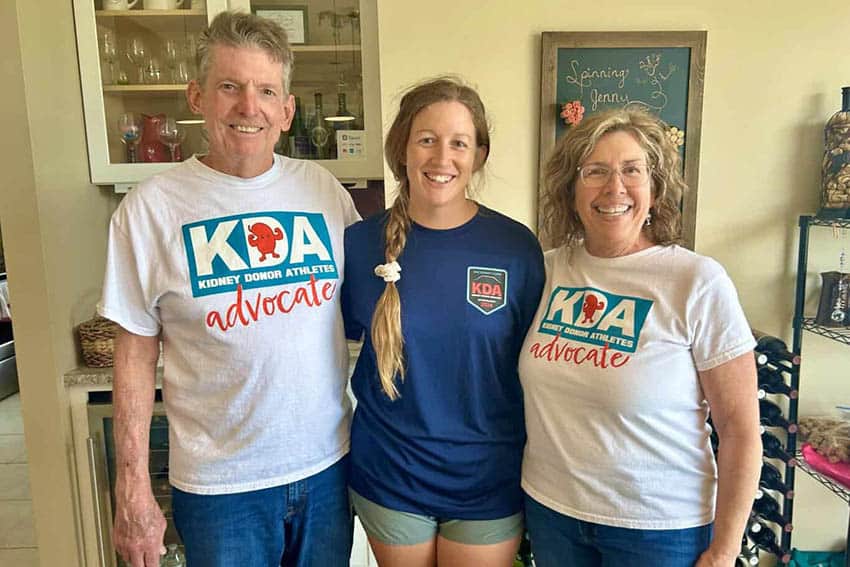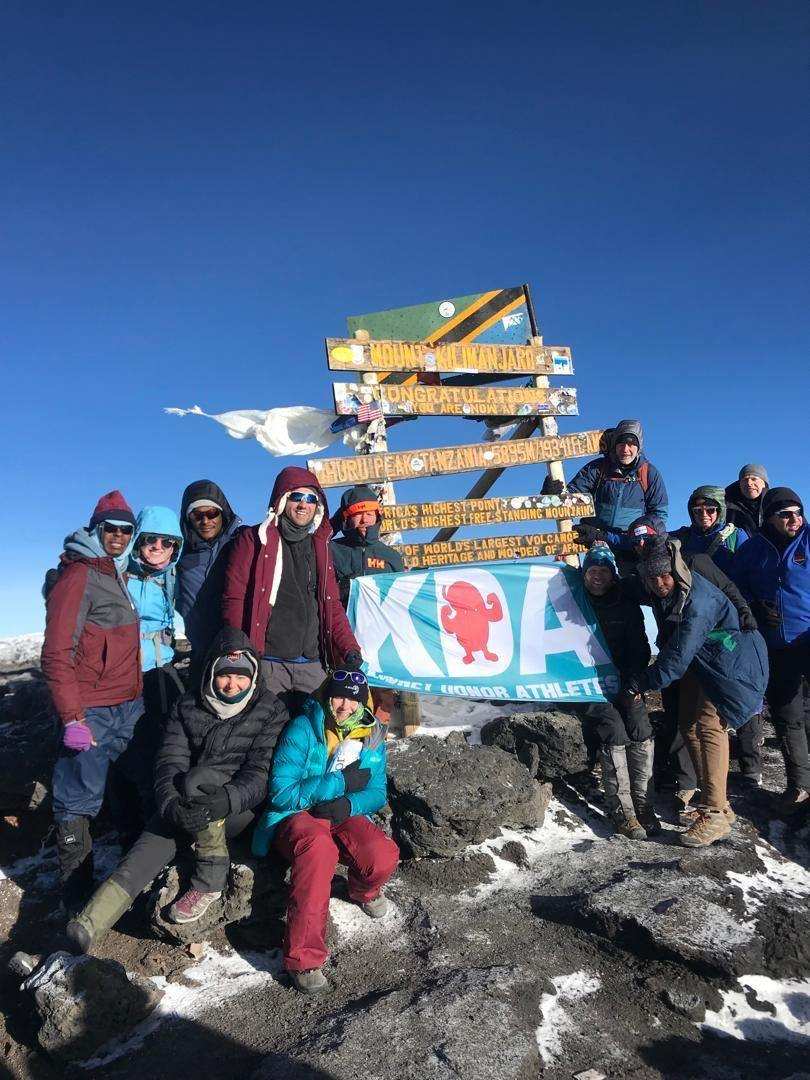Daughter Donates to Dad
Then climbs the highest mountain in Africa

By WILLIAM PAINE
Patriot Publishing
Sibley Brown is what one might call an Outdoorsy Type. Her idea of a good time is walking up and down mountains, sometimes for hundreds of miles at a stretch.
Sibley’s parents, Curtis and Jennifer Brown, run the Spinning Jenny Vineyard in Draper. It is Sibley’s close relationship to her family that culminated in a life changing decision, for herself and for her father.

The Brown family moved to Draper in 2005 and opened Spinning Jenny Vineyard in 2019. Sibley, meanwhile, attended middle and high school in Pulaski County. She graduated from PCHS in 2010.
Sibley went on to attend the University of Central Florida earning her certificate to teach English as a foreign language before eventually attaining a master’s degree in education.
Sibley Brown subsequently spent three years teaching English overseas before returning home to teach Spanish in 2015/2016 at Pulaski County High School.
“I’ve moved around a lot,” said Sibley. “I spent a year here but still had the travel bug and so I moved to Morocco to teach English after that. I did that until 2018 and then I hiked the Appalachian Trail (AT) from Georgia to Maine. I started in April and finished in October and I loved it. So, at that point, I was kind of thinking I wanted to be more outdoors.”
Among the difficulties involved in hiking the 2,190 mile Appalachian Trail, Sibley noted, is that “It rained a lot and you’d go 3 or 4 days without ever getting fully dry … and the terrain is pretty rough.”
Sibley Brown’s aptitude for long distance trekking was not passed down from her parents.
“I grew up here somewhat aware of the Appalachian Trail,” Sibley recounted. “When I was in high school, I went out and hiked McAfee’s knob out in Catawba and saw some thru hikers but they were always like skinny bearded men and it wasn’t ever something I associated myself with doing. My parents like being outside gardening or on the farm but we never camped. When I was on the AT, my dad would text me with ‘Goodnight. I’m going to bed on my MATTRESS.’ …. So, they think I’m crazy.”
After hiking the AT, Sibley had planned to return overseas to teach English but learned of her father Curtis Brown’s worsening health while on the trail.
“My father has polycystic kidney disease,” Sibley explained. “My grandmother had it. She had a transplant in the 90’s. So, we kind of knew he was going to need a transplant and growing up that was never scary because I could see my grandmother. She was a very active older person.”
“It was such a slow process because you know the disease I had takes 30, 40 years for it to finally get to kidney failure,” Curtis Brown recounted. “So, you don’t really notice it. But toward the last six months it kind of went exponential. I just felt real fatigued all the time and had a lot of muscle cramps.”
Sibley’s grandmother was able to receive a replacement cadaver kidney after only waiting a few months but because of his blood type O, Curtis Brown was likely going to have to wait between seven and ten years for a cadaver doner.
“O is the universal donor but not the universal receiver,” said Sibley. “A rarer blood type is potentially better because if you’re an A, you can receive an A kidney or an O kidney but if you’re an O, you can only receive that O and all the O kidney’s go to anyone who is above you on the list.”
“That’s 7 to 10 years where he would need to be on dialysis, four days a week, four hours a day,” she continued. “When they told you that they said like 50% of people don’t survive more than three years on dialysis. Wow, that math doesn’t work. We need another solution!”
That was when Sibley and her family considered the idea of donating one of their kidneys to cure their father of his increasingly worsening condition. Sibley is the only member of her immediate family that shares her father’s O blood type and as such, only she could make a direct donation to her father. Her siblings could have donated but the process would have been more convoluted.
“If you have a willing donor who’s not a match, they’ll find you another pair somewhere in America who are the same but the opposite,” she explained. “So if you have an A to offer but need an O, they’ll find someone else who’s got an O to offer but needs an A kidney and then you just donate to each other’s recipient.”
After further testing it was revealed that Sibley was not afflicted with polycystic kidney disease, which is passed down to 50% of a parent’s offspring. If she had tested positive for the disease, she would have been declared an unfit donor.
Sibley Brown finished the AT in 2018 but soon found a job teaching English as a second language in New Hampshire. She had planned to undergo the kidney donation operation during the summer break but it wasn’t until December 12, 2019, before the procedure took place. Instead of recuperating through the summer, Sibley went to work at the end of winter break, 2 ½ weeks post op.
“It’s a laparoscopic surgery, which is amazing, said Sibley. “It means you lose like a teaspoon of blood … but that first week was tough. They have to pump you up full of gas so that the little robots that are doing the surgery can like get in there. After the surgery the gas can cause a lot of pain where it sort of like rises through your body. For me, I felt a lot of pain in my shoulders. Otherwise after that first week, I felt weak but otherwise fine.”
“People ask, how were you coming out of the hospital and how was Sibley?” Added Curtis Brown. “I say Sibley gave a kidney. I got cured by the treatment. When I came out, I was much better. Within 24 hours, I was back to what I was when I was 30 years old, as far as kidney function goes. So, it was remarkable. So, I have three kidneys now. I have my two and they just put the other one right down here (points to his lower right abdomen).
Counterintuitively, Sibley donated her left kidney.
“They like the left one because one of the veins is longer and that makes it easier to graft it into the new person,” Sibley responded. “There’s a couple of very minor lifestyle changes I had to make after surgery. One is just being vigilant about staying hydrated, which is especially important because I work outdoors in the desert. I can’t take ibuprofen, naproxen anymore but I can still I can still take Tylenol. The surgeon also told me that I shouldn’t take up boxing, which was not really on my radar anyway.”
“My sister just had a transplant two days ago,” said Curtis. “She has the same kidney disease that I had. So, for me it was pretty miraculous because she’s been on dialysis for over a year and it’s been horrible.”
Not long after her surgery, Sibley was back to her old habits and proceeded to hike the 2,653-mile Pacific Crest Trail (PCT). About this same time, Sibley found the Kidney Donor Athletes, whose mission is to promote kidney donation through sharing stories of athletic achievements made by kidney donors.
While on the PCT hike Sibley wrote an article for Kidney Donor Athletes, as well as blogging for Trek Magazine.
“I couldn’t find anyone who’d hiked through one of these long trails after donating a kidney,” said Sibley after researching the topic. “So yeah, so I wanted to kind of share that experience.”
When she discovered that Kidney Donor Athletes was taking applications to hike Mount Kilimanjaro, Sibley jumped at the chance. In Spring of 2023, Sibley was chosen for the Kilimanjaro ascent team. She spent the next year training, fundraising and doing zoom calls with race organizers.
On March 6 of this year, Sibley Brown flew to Tanzania and joined the Kidney Donor Athletes who planned to summit the 19,341-foot peak of Kilimanjaro.
“We did something like 40 miles or so over the eight days,” said Sibley describing the hike. “All of it is actually pretty reasonable until the summit push because they keep you going really slow, all the way up. That gives time to acclimate to the elevation. Then on summit night, you wake up in the middle of the night so you can get to the top for sunrise both for the view and then also just the weather. That’s the safest weather window.”
“We started hiking at like 11:30 pm and got to the summit at 6am,” Sibley continued. “Then we came back down to base camp, slept for like an hour and then hiked down to 10,000 feet because they want to get you down. That day was like 14 hours of hiking, climbing 4000 feet from base camp to the summit and then descending almost 10,000 feet all in one day and all on three hours of sleep. So that day was one of the most intense hiking days I’ve ever experienced.”
“There were 14 of us and 12 of us made it to the summit and yeah, afterward we had a big celebration and I realized it was the first time I’d ever met other living donors,” Sibley added. “They were from all different background and all different ages. The youngest was 26 and the oldest was in his early 60s. They do all different kinds of sports. A couple triathletes, a couple of marathon runners and a couple who are more into like powerlifting.”
On her return from Tanzania, Sibley stopped by Spinning Jenny Vineyard before setting off to her current residence in Phoenix, Arizona. For the past three years Sibley Brown has worked as a backpacking/hiking guide for REI, whose motto is “A life Outdoors is a Life Well Lived.”
“I’m based in Scottsdale where REI’s Southwestern Adventure Hub is,” she related. “I guide in Grand Canyon, Sedona, Zion National Park, Joshua Tree National Park and Bryce Canyon. We do a lot of different levels of trips from backpacking to what REI calls Signature Camping, which is like glamping.”
“I say that if I ever tell Jennifer I want to go camping, we’ll know the kidney’ s taken over because under no circumstances do I ever want to go camping but all Sibley ever does is go camping,” said Curtis of his new kidney. “My mother lived till 89 almost 9 years after having a kidney transplant. So, you know, it can really make a huge difference. And when you compare that to people that go on dialysis, there’s much less chance of that kind of longevity. So, it was pretty remarkable.”
Sibley is equally happy with her decision to donate to dad.
“My niece was born last month while I was in Tanzania,” said Sibley. “So yeah, just knowing that he’s around to be their grandpa. My little sister’s getting married in January. He’ll be around to walk her down the aisle. It’s just makes it worth it. For sure.”
“It makes me cry,” said a teary-eyed Jennifer Brown. “I’m so proud and thankful. We’re so pleased to continue be an active part of the community because of what Sibley’s done.”

